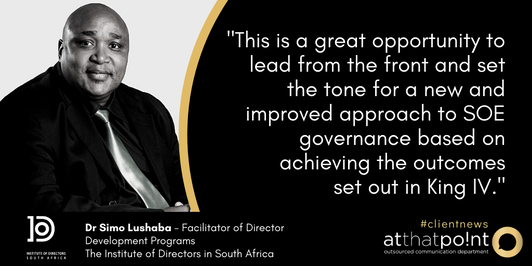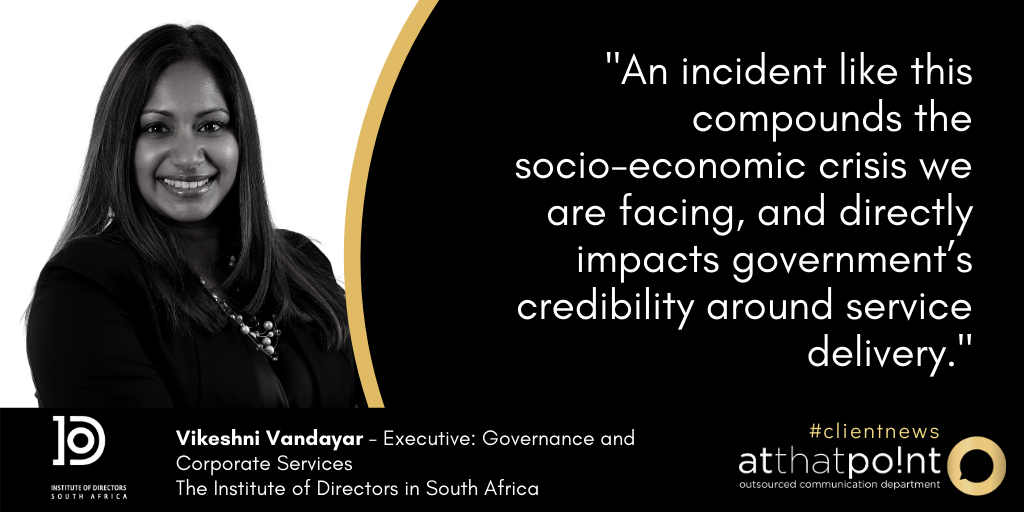Mzobe appointment highlights the need for transparency in SOE board appointments, says IoDSA31/8/2020 The recent appointment of former ANC Youth League leader, Magasela Mzobe, to chair the interim board of Umgeni Water has elicited negative comment. Dr Simo Lushaba, Facilitator of Director Development Programs at the Institute of Directors in South Africa (IoDSA), says that more public transparency is needed on these appointments in order to build stakeholder trust and, ultimately, give the appointees the best chance of succeeding in their new positions.
“The appointment of board members and key executives to state-owned enterprises (SOEs) presents a significant governance challenge because these appointments are made by the state as shareholder and not by the accounting authority (board), which would be governance best practice,” Dr Lushaba says. “King IV’s Sector Supplement for SOEs recommends that ‘The SOE and the executive authority should be transparent regarding the processes followed for the nomination, election and appointment of governing body members.’ If ministers are not transparent about the reasons they appoint people to board or executive positions, the public may jump to the unfortunate conclusion that the appointments are political, especially given what has been going in our SOEs for too long. “Perception is critical when it comes to building and/ or restoring trust.” Principle 7 of King IV says that “The governing body [i.e. board] should comprise the appropriate balance of knowledge, skills, experience, diversity and independence for it to discharge its governance role and responsibilities objectively and effectively.” In its Recommended Practices, the King Report makes it clear that the governing body should ideally have the responsibility for ensuring it has the right composition of members to discharge its duties. However, SOEs represent a special case because their founding legislation typically gives the government as sole shareholder the power to appoint board members and, often, senior executives. Consequently, in its Sector Supplement for SOEs, King IV makes the recommendation noted above that the governing body/ accounting authority and shareholder should work together and in a transparent way to follow governance best practice as closely as possible. “If this course is not followed, the board is placed in the untenable position of being held accountable for the organisation’s performance but with little or no control over who sits on the board or in the executive suite,” Dr Lushaba points out. “The IoDSA’s recent paper, ‘Challenges facing public-sector boards’, identifies board composition as a key issue for SOEs and, of course, the position of chair is particularly important. In this instance, the Minister’s spokesperson has said that this appointment was made in line with King IV, but in fact this is questionable. As noted, King IV’s Sector Supplement for SOEs highlights the need for transparency and collaboration between the shareholder and board, and simply saying the Minister took King IV into account is just not good enough. “I would respectfully remind Ministers that King IV’s principles are framed in terms of outcomes, not boxes to be ticked and that the reaction to this particular appointment shows that the desired outcome of restoring trust and legitimacy may not have been achieved. This is a great opportunity to lead from the front and set the tone for a new and improved approach to SOE governance based on achieving the outcomes set out in King IV.” ENDS MEDIA CONTACT: Stephné du Toit, 084 587 9933, [email protected], www.atthatpoint.co.za For more information on the IoDSA please visit: Website: www.iodsa.co.za Twitter: @The_IoDSA LinkedIn: Institute of Directors in South Africa Company Page
0 Comments
The furore around the awarding of a contract to a politically connected individual’s company shows that government has not yet accepted its role as custodian of good governance for South Africa Inc—and the extent of public disenchantment with perceived corruption. That this flouting of basic governance principles around conflicts of interest was shown by people in the highest echelons of government in a matter directly related to a severe national crisis was especially worrying, says Advocate Fay Mukaddam, Chartered Director and Technical Advisor at the Institute of Directors in South Africa (IoDSA).
The scandal involves the awarding of a R125 million contract for personal protection equipment to a company owned by Madzikane Diko, the husband of the Presidential Spokesperson, Khusela Diko. The Dikos are close friends of Gauteng Health MEC Bandile Masuku, who is leading the province’s response to COVID-19, and his wife, City of Johannesburg MMC, Loyiso Masuku. “That this tender for vital personal protective equipment was bid for, and granted, despite a clear conflict of interest is hugely disappointing, and points to a cynical disregard for the most basic rules of governance,” she says. “Leaders cannot take refuge in claims of ignorance or that they did not think things through: the rules are very clear here, and our leaders are expected to follow them. Following proper due diligence processes is critical when awarding tenders, of course, but when these are short-circuited as they were because of the urgency, we have to rely on leaders to do the right thing.” Vikeshni Vandayar, Executive: Governance and Corporate Services at the IoDSA, says that public servants need to recognise that they have a duty to act in the best interests of SA Inc., and that government’s money derives directly from taxpayers and they thus have a duty to ensure it is managed effectively to the betterment of South Africa Inc and its citizens. “One could say that public servants have what amounts to a fiduciary duty to the public when it comes to disbursing public funds. Government is ultimately the custodian of governance for the country as a whole— the improper application of COVID-19 funds is having a direct and calamitous effect on frontline medical staff and their patients,” she says. “If a board does not provide ethical leadership and set the tone, the whole company will suffer; the same is true of the state. An incident like this compounds the socio-economic crisis we are facing, and directly impacts government’s credibility around service delivery.” Advocate Mukaddam says that while it must be recognised that people have to earn a living, perception was important. One of the trade-offs inherent in good governance is that those with connections to state officials may not enter into business relationships with the state. These conflicts of interest must not only be identified by role players, but they also need to be resolved satisfactorily; it is important, too, that transgressors are seen to be held accountable. “It’s common cause that corruption has infected the body politic to an unbelievable extent, with grave consequences for the social compact generally, and for service delivery in particular. One can take some heart from the fact that the ANC has forced Ms Diko and both Masukus to take a two-week leave of absence and appear before the party’s Integrity Committee, while the Chair of SCOPA is calling for a criminal trial,” she says. “Swift action will help, but the credibility of the provincial and national government, and particularly their response to the pandemic, has been damaged. “Poor governance and unethical leadership have consequences.” ENDS MEDIA CONTACT: Stephné du Toit, 084 587 9933, [email protected], www.atthatpoint.co.za For more information on the IoDSA please visit: Website: www.iodsa.co.za Twitter: @The_IoDSA LinkedIn: Institute of Directors in South Africa Company Page |
Archives
July 2024
Categories
All
|



 RSS Feed
RSS Feed